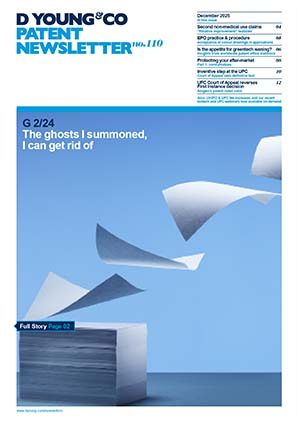Happy birthday to the German Federal Patent Court!
On 01 July 1961, sixty years ago to the day, the Bundespatentgericht (also known as the BPatG or in English the German Federal Patent Court or FPC) commenced its work. The court is a supreme federal court and falls within the remit of the Bundesministerium der Justiz and für Verbraucherschutz (German Federal Ministry of Justice and Consumer Protection).
To mark the German Federal Patent Court’s 60th anniversary, D Young & Co partner Hanns-Juergen Grosse, a European, Chartered (UK) and German qualified patent attorney, provides a brief history of the court, its components and responsibilities.
German Federal Patent Court
Like the DPMA (Deutsches Patent und Markenamt / German Patent and Trade Mark Office), the German Federal Patent Court is located in Munich.
The German Federal Patent Court has 25 senates with 47 legally qualified members and 55 technically qualified members.
In May 2021, Dr Regina Hock took over presidency of the Federal Patent Court from Beate Schmidt who had served as President since May 2011. Dr Hock headed the Legal Affairs division at the DPMA from 2011, and prior to that worked as a judge in the Federal Patent Court’s trade mark and technical appeal division. This is the fourth time that a female has lead the Federal Patent Court.
German Federal Patent Court decisions
All Federal Patent Court final judicial decisions since 2000 have been published on the Internet and are available on the court‘s website (http://dycip.com/fpc-decisions) currently only available in German. This service is free of charge when used for non-commercial purposes.
Pre-1961: German Patent Office Boards of Appeal
Up until 1961, decisions by the examining sections and divisions of the then so called German Patent Office (Deutsches Patentamt – renamed the Deutsches Patent und Markenamt as of 01 November 1998) were reviewed by “Boards of Appeal” forming part of the office with civil servants as their members. The Boards of Appeal’s decisions could not be appealed before a court.
However, the German Federal Administrative Court ruled in its decision of 13 June 1959, that a decision by the office’s Boards of Appeal constitutes an act by an administrative authority, and must therefore be open to judicial review. Article 19(4) of the Basic Law (Grundgesetz) ensures that anyone who believes that their rights have been violated by public authority can demand that those decisions be reviewed by independent courts; and the office’s Boards of Appeal were not considered courts within the meaning of Article 19(4) of the Basic Law.
Following an amendment to the Basic Law, the German legislature was able to establish the Federal Patent Court for matters concerning industrial property rights with effect from 01 July 1961.
Responsibilities of the German Federal Patent Court
For judicial examination of administrative decisions, the German Federal Patent Court decides appeals against decisions by sections and departments of the DPMA regarding patents, trade marks, utility models, topographies for protection of semiconductor products and designs, and against decisions by Boards of Appeal at the Federal Office of Plant Varieties (Bundessortenamt / BSA), which is located in Hannover.
The Federal Patent Court also decides in the first instance on actions for nullification of national patents, European patents effective in Germany and supplementary protection certificates (SPCs), and on grant or withdrawal of compulsory licences including amounts of the licence fees and adjustments of fees determined for a compulsory licence by judicial decision.
German civil courts
However, specialised civil courts of general jurisdiction deal in the first and second instances with actions for infringement of industrial property rights. In these infringement suits, the civil courts may not challenge the validity of the industrial property rights in dispute, insofar as conditions for granting protection have been examined in proceedings for granting of the rights. The German legislature has not made use of the possibility under Article 96(1) of the Basic Law of granting jurisdiction over infringement proceedings to the Federal Patent Court as well.
Patent litigation and validity - the “injunction gap”
Thus, jurisdiction over patent litigation cases and patent validity cases is separated between different courts, and the Federal Patent Court may rule on validity of a patent after a first instance infringement judgment, leading to the infamous “injunction gap”.
Although this is often referred to as the “separation principle” or “bifurcation system”, this separation seems more likely to be a consequence of providing judicial review of an act by an administrative authority.
German Federal Court of Justice
Anyway, the Federal Court of Justice (Bundesgerichtshof / BGH) in Karlsruhe acts as court of appeal for decisions of the Federal Patent Court and civil courts, primarily to ensure uniform application of law, through clarification of fundamental points of law and development of the law.
D Young & Co at the German Federal Patent Court
Our patent attorneys and lawyers qualified in Germany (as Patentanwalt/-anwältin or Rechtsanwalt/-anwältin) act as representatives before the Federal Patent Court.
Happy 60th Birthday BPatG!


